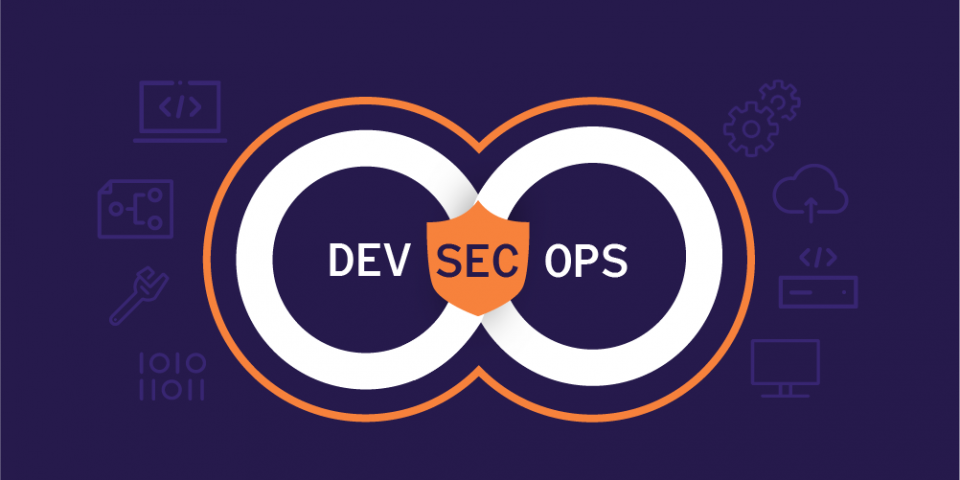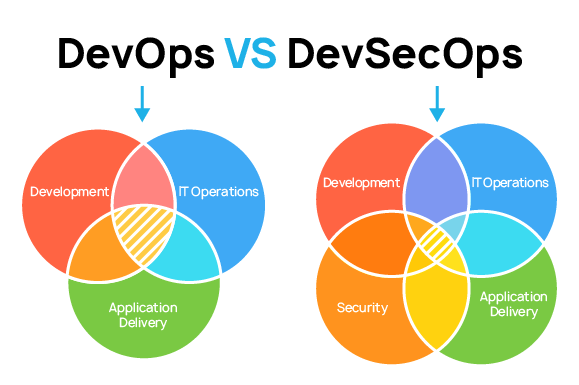DevOps and DevSecOps are two terms that have become increasingly common in IT. While these ideas have been around for a while, they’ve only recently started to catch on widely. So, what exactly are DevOps and DevSecOps, and what are their top differences? This article will break down DevOps vs DevSecOps difference and their similarities. If you’re trying to figure out what is devsecops vs devops, or if you need clarification on which fits your organization best, keep reading.
I. Overview of DevOps vs DevSecOps
1. What is DevOps?
DevOps is a methodology that merges software development (Dev) and IT operations (Ops) to expedite the delivery of software updates and features. It automates and streamlines the software delivery process, encompassing development, testing, deployment, and production. DevOps primarily aims to simplify and quicken the process for developers to move code into production by reducing procedural steps. It also enhances communication and collaboration between development and operations teams, increasing organizational efficiency and accelerating software delivery. Additionally, DevOps improves software quality by making it easier to identify and rectify errors, focusing on improving speed, quality, and efficiency in software delivery.

Key features:
- Security Integration: Seamlessly incorporating security into every stage of the software development lifecycle (SDLC), from planning to deployment.
- Shift-Left Approach: Integrating security considerations early in the development process rather than as an afterthought.
- Compliance Management: Ensuring development processes and products comply with relevant security standards and regulations.
- Threat Modeling: Proactively identifying potential security threats and vulnerabilities to address them before they become issues.
2. What is DevSecOps?
DevSecOps, a relatively recent concept, merges development and security within the DevOps framework. While DevOps focuses on automating and enhancing the efficiency of software development and deployment, DevSecOps adopts a comprehensive approach by embedding security at every phase of software development.
The goal of DevSecOps is to minimize vulnerability risks while boosting the pace and quality of software releases. It typically involves employing automation and collaborative tools to facilitate smoother communication and workflows among Development, Security, and Operations teams. By weaving security into the DevOps cycle, DevSecOps enables organizations to accelerate software delivery and diminish vulnerability risks.

Key features:
- Security Integration: Effortlessly integrating security throughout the entire software development lifecycle (SDLC), from the initial planning phase to the final deployment stage.
- Shift-Left Approach: Integrating security considerations early in the development process, rather than as an afterthought.
- Compliance Management: Ensuring that development processes and products comply with relevant security standards and regulations.
- Threat Modeling: Proactively identifying potential security threats and vulnerabilities to address them before they become issues.
II. Key Differences between DevOps and DevSecOps
Let’s find out what is the difference between DevOps and DevSecOps:
01. Philosophy
DevOps and DevSecOps embody distinct philosophies catering to varied organizational needs in software development. DevOps emphasizes rapid delivery and efficiency, focusing on swift feature deployment while maintaining quality. This approach suits organizations requiring agile software updates.
Conversely, DevSecOps prioritizes security to eliminate risks and vulnerabilities from the outset. It’s particularly apt for organizations dealing with sensitive data or under strict compliance regulations. Choosing between Azure DevOps vs DevSecOps depends on what aligns best with your organization’s requirements.
02. Security Approach
One of the most significant differences between DevOps and DevSecOps is their security approach. DevOps streamlines software delivery automation, while DevSecOps places security at the forefront. DevSecOps is often seen as the more secure option, though each has its security pros and cons. The best approach depends on specific organizational needs and priorities.
03. Purpose
DevOps and DevSecOps, while fostering developer and operations team collaboration, diverge in their core focus. DevOps aims to optimize the software development cycle, whereas DevSecOps incorporates security as a fundamental aspect. By embedding security early in the development process, DevSecOps mitigates vulnerability risks and eases compliance with security standards. Thus, DevSecOps is often viewed as a more encompassing software development approach than DevOps.
04. Goal
DevOps promotes cooperation between developers and operations teams to enhance software development speed and efficiency. It helps break down team silos, potentially causing delays. However, implementing DevOps can be challenging, especially in larger, process-entrenched organizations.
DevSecOps modifies the DevOps model by intensifying the focus on security. It aims to integrate security considerations throughout the development process. While this can slow development, it prevents code vulnerabilities, making it less ideal for organizations prioritizing rapid feature releases.
05. Emphasis
DevOps and DevSecOps, are both popular in software development, stress development, and operations collaboration. The key distinction lies in their focus: DevOps prioritizes speed and efficiency, while DevSecOps emphasizes security. DevOps typically leads to faster delivery and improved quality through continuous delivery and integration. However, its speed may sometimes overlook security aspects.
In contrast, DevSecOps adopts a Security-First stance, embedding security at every development stage. This approach balances accelerated delivery with ensuring application safety and security.

06. Team Skill Set
DevOps teams focus on software development and maintenance, while DevSecOps teams concentrate on securing this software. Both require high skill levels, but their focuses differ. DevSecOps teams generally have a deeper understanding of security and adopt a more proactive security approach, unlike DevOps teams, which are more technically oriented in software development.
07. Challenges
While DevOps encourages development and operations team collaboration, DevSecOps adds a security layer. Integrating security into streamlined processes without hindering speed is a significant challenge for DevSecOps. This might involve automated security tests in the CI/CD pipeline or defining security roles within teams. DevSecOps demands proactive security measures, potentially requiring more resources initially but leading to a more secure product.
08. Advantages
DevOps and DevSecOps both offer efficient software development paths. DevOps streamlines software release through team collaboration, while DevSecOps extends this by integrating security. Implementing DevSecOps can be more complex due to additional security layers. The choice between the two depends on organizational needs, with DevSecOps being particularly beneficial for data-sensitive or regulated industries.
Learn More On:
III. Similarities Between DevOps and DevSecOps
| Aspect | Description |
|---|---|
| Automation Emphasis | DevOps and DevSecOps prioritize automation in software development and deployment, leading to faster releases and more stable code rollouts. While they both integrate security throughout the development cycle, DevSecOps focuses explicitly on security protocols to safeguard sensitive information and prevent breaches. This additional security focus distinguishes DevSecOps as a more thorough approach to software development despite sharing core principles with DevOps. |
| Proactive Monitoring | Active monitoring is integral to DevOps and DevSecOps, encompassing error detection, security breach prevention, and performance optimization. This ongoing scrutiny ensures smooth and secure operations for developers and users alike. DevSecOps’ heightened emphasis on thwarting and identifying security threats is the primary distinction. Both methodologies champion continuous enhancement and teamwork to ensure efficiency and dependability, embedding security into every phase of the software development lifecycle. |
| Collaboration and Communication | A common thread in DevOps and DevSecOps is the emphasis on team collaboration and communication. These approaches encourage merging development, operations, and security teams for a cohesive workflow. Both advocate for automation, regular testing, and frequent updates to boost efficiency and adaptability. However, DevSecOps extends its focus to include security integration throughout the entire process, compared to DevOps’ concentration on development and operations. Ultimately, both strategies aim to enhance productivity and establish more secure user systems. |
Conclusion
In summary, while DevOps accelerates software development, DevSecOps adds a crucial layer of security, ensuring fast-paced development is secure. Choosing between them depends on your organization’s specific needs for speed and security.
If you’re weighing the benefits of DevOps vs DevSecOps for your organization, TECHVIFY is here to help. Contact TECHVIFY for expert assistance in making the right choice for your software development needs.
TECHVIFY – Global AI & Software Solution Company
From Startups to Industry Leaders: TECHVIFY prioritizes results, not just deliverables. Accelerate your time to market and see ROI early with high-performing teams, AI (including GenAI) Software Solutions, and ODC (Offshore Development Center) services.
- Email: [email protected]
- Phone: (+84)24.77762.666





